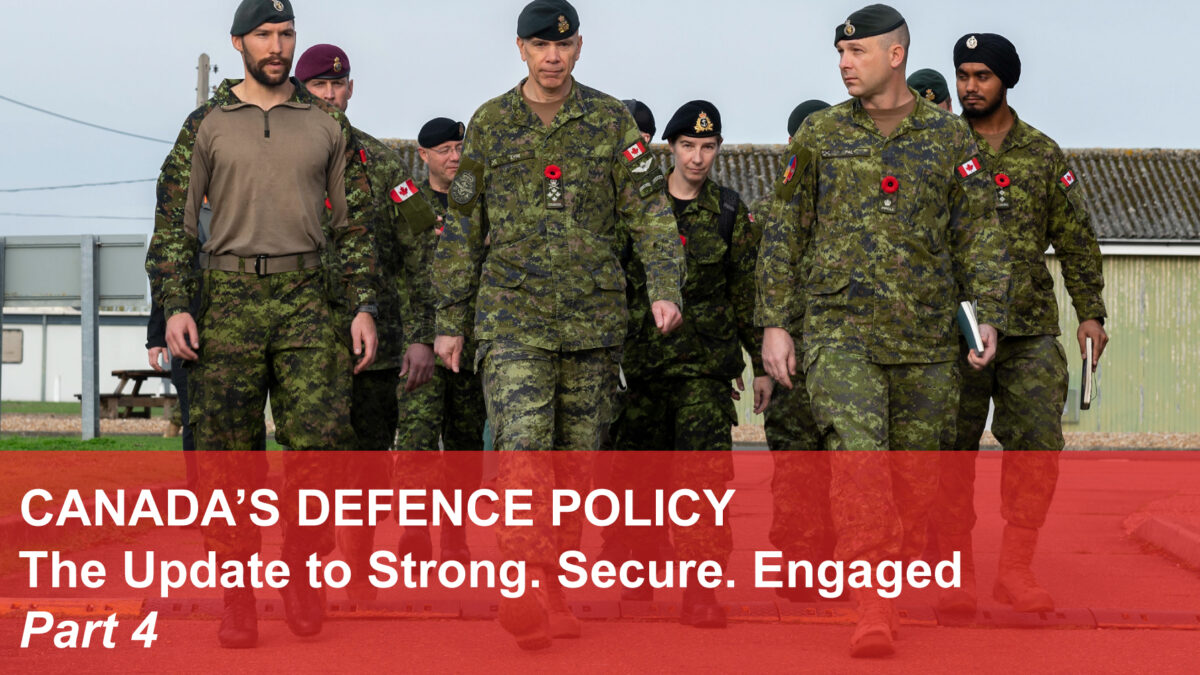Getting it right
The last … that must be first
In this final ‘note of encouragement’ toward Canada’s overdue defence policy update, we look at what must come first in a Western-democratic, all-volunteer force: the individuals who serve, the culture and context in which they serve, and the institutions that develop these.
Numbers: in their gift
In the face of plunging numbers, reputation, and morale, the #1 job of our Service Commanders and their military leadership teams is work in hand with the Chief of Military Personnel to recruit, develop, and professionalize their service members. Without strong numbers of good, capable, developed, and motivated service members, there is little point in the many other priorities of Service Commanders, including seeking new equipment or infrastructure.
And unlike my previous note on funding, organization, and procurement, arresting the decline and rethinking the recruitment, cultural and developmental base of our Canadian Armed Forces is squarely in the gift of our military leadership: Commanders, Officers, and NCOs alike.
Culture: because we expect better
Culture doesn’t just eat strategy for breakfast; it eats everything.
“Why is it,” asked the USAF LCol of our staff college group, “that a military member accused of a crime or abusive behaviour is so much more newsworthy than, say, a company worker accused of the same thing?” “The answer”, he explained, “is simple: we expect better. We expect more and better of a man or woman in a profession, and more again if in uniform.”
Today’s military leadership challenge is to build a modernized culture which combines the best of the past with the best of the present: retaining the concept of, yes, truth, duty, and valour in service, while respecting our wonderful diversity as individuals: creed, ethnicity, or two-spirit.
And while to err may be human, successful cultures include the fair, prompt application of disciplinary measures, without exception.
Inseparable: a new social contract
A modernized social contract is inseparable from a modernized culture … and Canada’s needs fixing.
Providing support to military families – during missions, moves, and the return of their loved ones – is not about welfare; it’s about modern leadership. Externally recognized trade certifications and professional qualifications are not about benefits; they’re about professional growth and reserve capacity. Flexibility in terms of service is not about reducing commitment; it’s about career-blending and diversity of experience.
Institutions: change is the answer
Canadians from Vimy onward have brought excellence of personnel and leadership to theatres as vastly different as Europe, Afghanistan, and the North Atlantic.
That excellence didn’t just happen. It started with generating interest among Canada’s best in our homes and schools … and developing those interested to “be the best they can be” in our training schools and units, in our military colleges, and in our senior leaders’ schools and staff & command colleges.
These institutions are the foundation of Canada’s military profession. They are essential to creating and maintaining the highest standards of our Canadian values in our military together with the professional competence and the robustness of character needed when our service members are called upon to use judgement and, if necessary, lethal force in defence of Canada and its interests.
Militaries and their establishments are among the oldest institutions in society. These institutions have changed – again and again – in parallel with our civil society, sometimes leading, sometimes lagging.
Abolition of institutions with faults is not the answer. (Let the institution without fault cast the first stone?)
Progressive change is the answer, and this will need focused, exceptional leadership.
_____________
Jake Jacobson has studied and served for more than five decades in defence: at sea and in major programs for the Navy, in industry in a variety of executive roles, and as an Assistant Deputy Minister Chief of Staff for the Materiel Group in the Department of National Defence.
_____________

